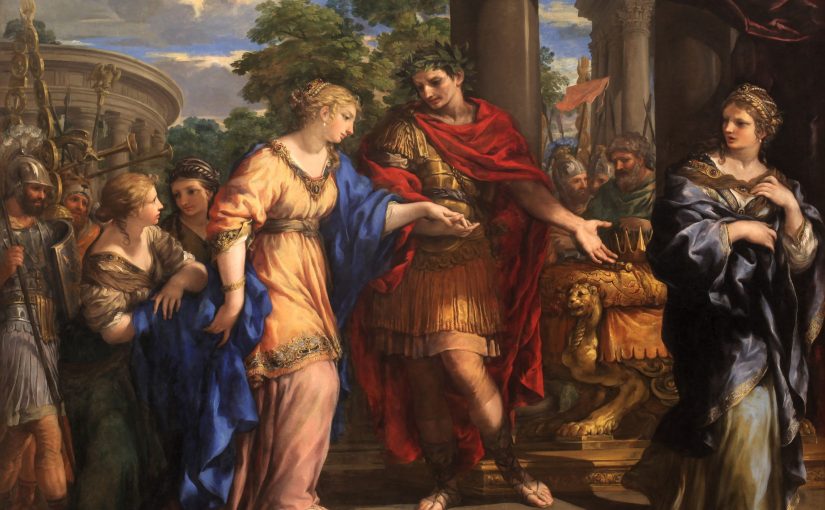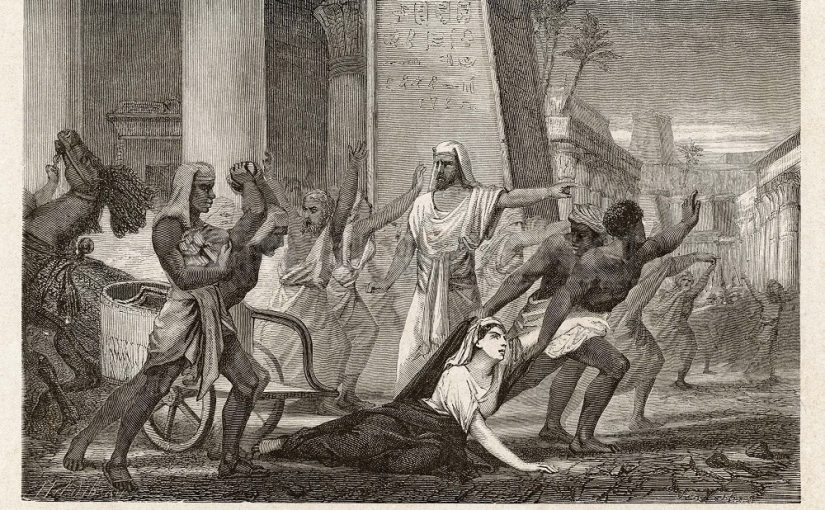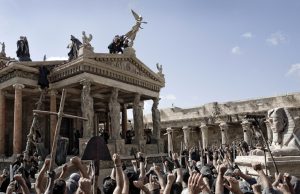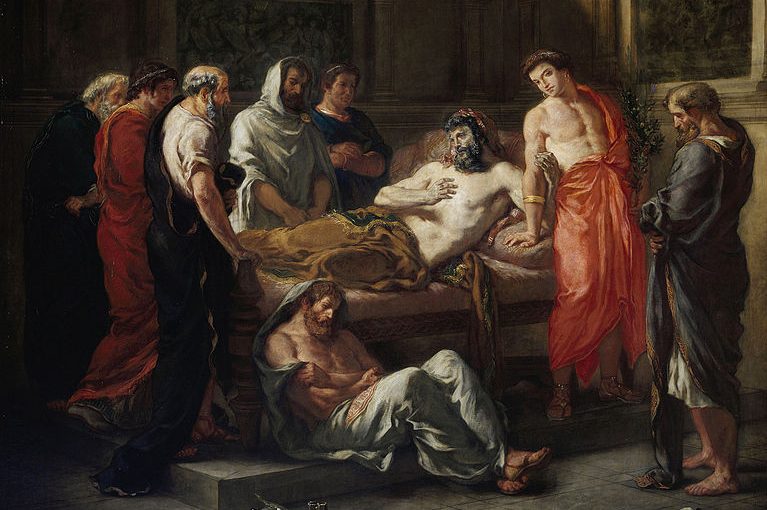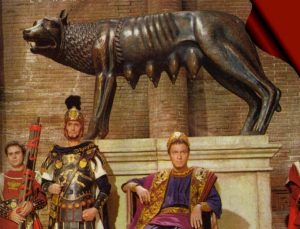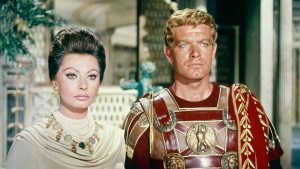By Eleanor Kaestner
Plot Outline
The film Cleopatra begins in 48 B.C. at the close of the civil war for control of the Roman Republic. Julius Caesar (Rex Harrison) has defeated Pompey in the battle of Pharsalus, which ended the war. Caesar learns that Pompey has fled to Egypt in hopes of gaining support from Pharaoh Ptolemy XIII (Richard O’Sullivan) and his sister Cleopatra (Elizabeth Taylor). In response, Caesar sends his trusted military advisor Mark Antony (Richard Burton) to Rome, while he goes to Egypt in search of Pompey.
When Caesar arrives in Alexandria, the capital of Egypt at that time, there is a citywide market occurring; in order not to look intrusive, Caesar instructs his men to go marketing. This was one of Caesar’s tactics in gaining the trust of the Egyptian people, before he exercised his power. Caesar learns that Ptolemy, no longer wishing to share the throne with his sister Cleopatra, drove her away from Alexandria and seeks to destroy her. He approaches Ptolemy saying that he came to Egypt as executor of the will of Ptolemy Auletes, the father of the current pharaoh. According to Caesar, he was directed by the will to keep peace between the joint rulers of Egypt, Cleopatra and Ptolemy. During this encounter, Ptolemy presents to Caesar Pompey’s head and his ring, in an attempt at showing his appreciation for Rome. Although Caesar had been looking for Pompey, he did not wish for him to be murdered. Caesar, in testament to his character, asks for the rest of Pompey’s body to be found and buried honorably.

Once settled in the palace, Caesar receives a package, in the form of a rolled-up rug, which was said to be from Cleopatra. When he unrolls this, Cleopatra is revealed inside having used the rug to sneak into the palace. The young Cleopatra charms Caesar with her beauty, standing her ground and projecting her power as queen while talking to him. She teases Caesar by pointing out his out-of-date maps, showing that even though she is a woman, she is educated and can lead the country just as well as a man. Cleopatra describes her desire to be sole ruler of Egypt; in a bid for Caesar’s support she claims that “Roman greatness is built upon Egyptian riches,” implying she will pay him for his support. Throughout Caesar’s stay, Cleopatra continues her seduction of him, inviting him in while she is getting massaged and taking a bath.
When Cleopatra warns Caesar that Ptolemy XIII has surrounded the palace with the armies of Achillas, Caesar orders the Egyptian fleet to be burned so that he can gain control of the harbor. The fire spreads and burns the library of Alexandria angering Cleopatra because she thought so highly of the knowledge the books contained. She blames Caesar and, during their fight, Cleopatra and Caesar kiss, officially beginning their romance.
Mithridates of Pergamum arrives the next day and relieves the siege merely by the presence of his forces. Caesar holds a meeting with Ptolemy XIII and his chamberlain to discuss the previous attacks; he charges the lord chamberlain with inviting and abetting war against Rome and with the assassination attempt on Cleopatra. Ultimately, the chamberlain is sentenced to death, Ptolemy is removed from the protection of Rome and sent out of the palace to join his troops. This punishment held the possibility of death because Caesar’s army and that of Mithridates were still fighting Ptolemy’s troops.
Caesar crowns Cleopatra as queen of Egypt in 47 BC and she tells him that she dreams of ruling the world with him. When Caesar is declared dictator of Egypt for a year, he trusts Mark Antony to take care of Rome while he stays in Egypt. Caesar and Cleopatra have a son during this time, Caesarion, who is accepted publically and said to carry on Caesar’s legacy, although the people of Egypt believe the marriage was a political alliance, not because of love.
Caesar returns home to Rome, and the Roman people and senate do not like the idea of calling Caesar “dictator” because it reminds them too much of the title of king. When Egypt is named an official ally of Rome, Cleopatra and Caesarion come to the city. It has been two years since the couple has seen each other, but Caesar puts on a large ceremony and gathering for their grand arrival. Cleopatra is admired by the Roman people, and Antony says, “The Queen has conquered the people of Rome.”
The senate is still discontented with Caesar especially when he proclaims “I must be the law, and my word must be the welfare of Rome… you will appoint me emperor of the throne” which results in fighting between the senate and Caesar over policies and laws. The night before the Ides of March in 44 BC, the senate tells Brutus (Kenneth Haigh) he must “save Rome from Caesar.” The senate says they will call Caesar “king” everywhere except for the city of Rome. Caesar while talking to Cleopatra about the strife in the senate, responds that “I have never before settled for half a victory.” He says that, as dictator, he recently appointed senators who will be on his side for voting. However, the same night the senate plots to kill Caesar. The next morning Calpurnia (Gwen Watford), Caesar’s wife, dreams that he has been murdered, and Cleopatra is nervous about him going to the senate. Despite this Caesar goes and is murdered by the senate. His body is burned in a bonfire in front of the senate building attracting a large crowd of people. That evening, Cleopatra and Caesarion leave Rome by ship, Antony seeing them off.
For more than two years after Caesar’s death, Antony sought the assassins. At Philippi, he and Octavian (Roddy McDowell), Caesar’s nephew and adopted heir, finally defeat them. Antony, Octavian, and Lepidus decide to continue functioning as a triumvirate. Lepidus would have Africa, and the islands, Octavian would get Spain and Gaul, and Antony would have “all the rest” presumably the east. The three of them would jointly deal with Rome and Italy.
Antony began his reign in Asia Minor, but was informed that he would need supplies, food, and money from Egypt. Apprehensive about asking Cleopatra for help, Antony summons her. She arrives on a magnificent barge in Tarsus, however, she only agrees to meet with Antony on “Egyptian soil” better known as her ship. She holds a lavish banquet while wearing a necklace made of coins with Caesar on them, which Antony asks her about. After a night of Egyptian entertainment and a large feast, Antony follows Cleopatra back to her room and proclaims his love for her. He tells her how he always has been “one step behind Caesar, at the right hand of Caesar, in the shadow of Caesar . . . ” After this he rips off the coin necklace, and they become lovers.
Meanwhile, Octavian tells the senate that Antony has fallen under the influence of Cleopatra, threatening Roman control of Egypt. Octavian refers to himself as Caesar, and claims Caesar’s legacy, which threatens the supporters of Antony. Cleopatra hears of this and urges Antony to return to Rome and resolve his issues with Octavian. During his meeting with Octavian in Brundisium, Antony agrees to marry Octavian’s sister Octavia (Jean Marsh), to show the Roman people that he has not abandoned them, and to secure the alliance between Rome and Egypt. When Cleopatra hears news of this marriage of state, she becomes outraged and devastated. Antony however does not love Octavia, and becomes bored in her company; he tries sending envoys to Cleopatra, but they are blocked. Antony goes to see Cleopatra in person, and she makes him kneel before her in front of a public audience. Cleopatra says that Antony must cede to Egypt a third of the Roman Empire to seal a treaty between Egypt and Rome. Antony proclaims that “I only have one master, my love for you” and surrenders to Cleopatra. She responds that Antony must marry her under Egyptian ritual, declare Caesarion to be king of Egypt, and then together they will rule in Caesarion’s name until he is of age.
In Rome, Octavian convenes the senate and tells them of the marriage between Antony and Cleopatra, depicting Antony’s divorce of Octavia as a rejection of Rome. The senate tells Octavian that they do not want to go to war with Egypt and Cleopatra, because it will mean going to war with Antony. Octavian manipulates them into declaring war, however, by reading aloud Antony’s will. It declares that he wishes he be buried in Alexandria next to Cleopatra. The senators now convinced, pour into the streets and encourage the people to make war on Egypt. War is declared when Octavian throws the golden spear into the Egyptian envoy Sosigenes (Hume Cronyn), murdering him.
Antony and Octavian meet in Actium, Greece. Even though Antony’s officers had trained cavalry and foot soldiers for a land battle, Antony wishes to fight Octavian at sea because of the size of Cleopatra’s fleet. During the battle, Admiral Agrippa (Andrew Keir) carefully manipulates the Egyptian fleet, drawing them out and surrounding their ships. Cleopatra believes that Antony has been killed on the burning ship she sees from her own barge, so she sails away from the destruction in order to protect herself and her son. Antony, seeing her ship leave, chases after her on a small rowboat and climbs aboard, ignoring all the wounded and dying Egyptian soldiers who were hurt in the battle. In the meantime, Octavian lays seasick on his barge, depicted in the film as a weak leader, even though his forces won the battle.
Back in Alexandria with Cleopatra, Antony falls into a state of depression, and says he feels dead. Octavian sends Agrippa to Egypt to offer Cleopatra peace in exchange for Antony’s life, but Cleopatra refuses, and says he can “have two, or none.” Each night Cleopatra finds Antony sitting in the crypt, where he pities himself. He tells Cleopatra that love was his master, that he followed her back to Egypt because he was blinded by a love that took control over all else. Cleopatra and Antony decide he must meet Octavian with the two loyal legions of Egypt, a decision which helps alleviate Antony’s depression.
Cleopatra orders Apollodorus (Cesare Danova) to have escorts disguised as merchants lead Caesarion out of Egypt for the time being, while Cleopatra stays in Alexandria; she gives Apollodorus Caesar’s ring to keep safe for Caesarion.
Octavian prepares for battle. He gives his orders saying, “I want Antony alive, and I want her alive, she must be taken alive . . . Queen Cleopatra’s second succession through Rome will surpass her first.” The night before battle, Antony’s two legions abandon him for Octavian; he wakes to find his loyal military assistant Rufio (Martin Landau) murdered. Alone, Antony rides into the middle of Octavian’s troops.
The next scene shows Octavian, wearing the ring that Cleopatra had given to Caesarion, riding in front of a cart carrying the body of the murdered boy. Back in Cleopatra’s palace, Antony is told that Cleopatra is in the mausoleum; thinking she abandoned him again, he falls onto his sword. Carried into Cleopatra’s tomb, he dies in her arms. Octavian and his men are then shown entering Cleopatra’s palace, where they find Apollodorus dead from suicide, and learn that Antony is also dead.

Octavian rejoices at this news, as he no longer faces any competition for control of Rome. They go into the mausoleum and find Cleopatra with Antony’s body. Octavian says that Cleopatra can rule Egypt as a Roman province if she accompanies him to Rome to show his victory. She then notices that he is wearing Caesar’s ring, and thus finds out her son is dead. When Octavian is about to leave, she asks to rest alone with the promise of not hurting herself, swearing on the life of her son, which means nothing because she knows he is dead. Cleopatra writes a message to Octavian and then prepares for death. She commits suicide using a snake concealed in a fig basket. Octavian receives her message requesting to be buried next to Antony; he rushes to the tomb to see her dead with her two loyal servants.
Historical Background
According to Plutarch’s Life of Antony and Life of Caesar, there are parts of this film that agree with the historical record, while others are inaccurate representations. The inaccurate representations are used in the film either to thicken the romantic plot, or enhance the grandeur of the film. Plutarch in his Lives outlines his interpretation of the history surrounding this story, and writes to show character, not just the historical record of the time, so that the audience can see examples of virtue to better themselves.
Plutarch states that in 49 B.C., Cleopatra was forced out of Alexandria by her brother and co-ruler of Egypt Ptolemy XIII with encouragement from his three advisors Achillas the general of the army, Pothinus the financial manager, and Theodotus the tutor (Jones 25). During this time, Rome was involved in political unrest caused by the competition between Caesar and Pompey. In 48 B.C., Caesar defeated Pompey at the battle of Pharsalus in northern Greece, which prompted Pompey to retreat to Alexandria in hopes of gaining assistance from Ptolemy XIII. Caesar gave the Thessalians their freedom as a memorial of his victory, before heading in pursuit of Pompey.
Plutarch highlights how Caesar practiced clemency and spared the defeated whenever possible, especially when the people were or would be Roman, as in this case of the citizens who fought for Pompey in the Battle of Pharsalus (Jones 31). Plutarch tells how once Caesar arrived in Egypt, he freed Pompey’s friends who were arrested by Ptolemy and offered them his own friendship, because, he said, the “greatest and most signal pleasure of his victory gave him the ability to save the citizens who had originally fought against him” (Plutarch, Caesar 48.2). However, Achillas and Pothinus did not assist Pompey, and instead had him killed, in hopes of gratifying Caesar. Yet, when Caesar arrived in Alexandria he grieved at the death of Pompey, and asked for Pompey to have a proper burial, an act of Caesar’s high moral character Plutarch respects.
After his arrival, Caesar wanted to meet with Cleopatra, but because she was exiled, she had to sneak into the palace wrapped up in bedding and be brought directly into Caesar’s room. Cleopatra was born in 69 B.C. and was the third child of Ptolemy XII, the king of Egypt. It was said, “none could be compared with her, or that no one could see her without being struck by it, but the contact of her presence . . . was irresistible; the attraction of her person, joining with the charm of her conversation, and the character that attended all she said or did, was something bewitching . . . it was a pleasure merely to hear the sound of her voice, with which . . . she could pass from one language to another” (Plutarch, Antony 27.2-3). Cleopatra saw Caesar’s arrival as an opportunity to ask for help in her dispute with her brother Ptolemy XIII, because she knew from her father that Rome’s backing could help strengthen her position in Alexandrian politics (Jones 32). While talking to Cleopatra, Plutarch claims Caesar was captivated by her intelligence and way of speaking, demonstrating how Caesar cared about character and not just beauty. Caesar was named dictator of Egypt for a year, and in this role granted the kingdom of Egypt to the sibling rulers.
By the end of 48 B.C. the Egyptian forces led by Achillas plotted against the few Roman soldiers that were in Alexandria. Caesar took to burning his own ships in the harbor to block Achillas and his forces, but this fire spread and burned the great library, which caused Cleopatra great distress, showing her passion for learning, and her regret of the great texts being destroyed forever (Plutarch, Caesar 49.3). When reinforcements led by Mithradates arrived, the Romans crushed the Egyptian army, and Ptolemy XIII fled, soon drowning in the Nile river. After this, Caesar passed the Egyptian crown to Cleopatra and another younger brother Ptolemy XIV, but with Cleopatra in effect the sole ruler (Cyrino 130). After the war Caesar departed for Syria, leaving Cleopatra as queen and the mother of his son, Caesarion. Caesar left three legions in Alexandria, so they might remind Cleopatra she was queen because of Rome. Caesar after leading successful campaigns on his way to Rome was named dictator of the city, a perpetual and absolute power (Plutarch, Caesar 50.1-51.1). Plutarch says, “Caesar was born to do great things, and had a passion after honour, and the many noble exploits he had done did not now serve as an inducement to him to sit still and reap the fruit of his past labours, but were incentives and encouragements to go on, and raised in him ideas of still greater actions” (Plutarch, Caesar 58.2).
Cleopatra arrived in Rome sometime before 46 B.C, along with Ptolemy XIV and Caesarion. A statue of Cleopatra was placed in the temple of Venus during her visit, integrating the Egyptian Queen into Roman traditions (Jones 45). Cleopatra was also legitimized as ruler of Egypt and declared an ally of the Roman people; Egypt was thus protected from annexation. In the 1963 film, this was depicted inaccurately. In an extravagant scene Cleopatra and Caesarion enter the city on a large float through the Arch of Constantine. The Roman people are shown welcoming her, which did not happen according to the ancient texts. Many Romans felt Cleopatra’s presence was inappropriate (Caesar had been married to Calpurnia since 49 B.C.) and were not accepting of her. In the film, Ptolemy XIV was not shown in the grand entrance.
Nonetheless, a group of Roman senators were threatened by Caesar’s growing power and unpopularity with the people, so they plotted to kill him. Led by Marcus Brutus and Gaius Cassius Longinus, the senators planned Caesar’s assassination for the Ides of March in 44 B.C. Plutarch states that there were many apparitions and strange prodigies that happened leading up to his assassination, claiming, “fate, however, is to all appearance more unavoidable than unexpected” (Plutarch, Caesar 63.1). Coincidentally, the day before he was assassinated, Caesar and a senator were talking about what kind of death was the best, and Caesar replied, “a sudden one” (ibid. 63.4). The next day Calpurnia begged Caesar not to go to the senate, but he still went. In the film, Cleopatra, not Calpurnia, begs Caesar not to go to the senate; she is also shown consulting a soothsayer to predict the future. The film uses Cleopatra in place of Calpurnia in many scenes with Caesar, even though Calpurnia was his true wife.
The murder as described in Plutarch happened in a theater that Pompey built, implying a supernatural influence guiding the events that were to happen. When the senators began to stab Caesar, “which way soever he turned he met with blows, and saw their swords levelled at his face and eyes, and was encompassed, like a wild beast in the toils, on every side. For it had been agreed that each of them make a thrust at him, and flesh themselves with his blood; for which reason Brutus also gave him one stab in the groin” (ibid. 66.6). Following the murder, Caesar’s will was read. A large legacy was left to each Roman citizen (ibid. 68.1), an act Plutarch used to reiterate that Caesar was a good leader who in the end truly cared about all those he controlled and conquered. “That empire and power which he had pursued through the whole course of his life with so much hazard, he did at last with much difficulty compass, but reaped no other fruits from it than the empty name and invidious glory” (ibid. 69.1).
After Caesar’s death Cleopatra returned to Alexandria where she planned the murder of her brother and co-ruler Ptolemy XIV so she could place Caesarion on the throne as her co-ruler (Jones 55). Although Caesarion was the son of Caesar, he was not named as heir in his will; instead, Caesar adopted his great-nephew Gaius Octavius, adding him to the contest for control of Rome. Mark Antony was another candidate for succession because of his experience as Caesar’s trusted officer and colleague.
Despite the question of who would control Caesar’s empire, the triumvirate of Antony, Octavian, and Lepidus, set out against Caesar’s assassins in 43 B.C. In 42 B.C., they campaigned against Brutus and Cassius, and looked to Cleopatra for financial assistance. In 40 B.C. after the triumph over Brutus and Cassius at Philipi, the triumvirate agreed upon a division of the empire with the Eastern provinces falling to Antony, the western to Octavian, and Africa to Lepidus (Plutarch, Antony 30.4). After this, Antony was pursuing a war in the Parthian Empire, and looked again to Cleopatra for money, which would work in her favor for a Roman alliance. Cleopatra, just as portrayed in the film, arrived to meet Antony on the Cydnus River, “… in a barge with gilded stern and outspread sails of purple, while oars of silver beat time to the music of flutes and fifes and harps. She herself lay all along under a canopy of cloth of gold, dressed as Venus in a picture” (ibid. 26.1-2). Plutarch’s Cleopatra is one who awoke passions that tended to corrupt goodness and sound judgment. Plutarch asks how “he [Antony] could yet suffer himself to be carried away by her to Alexandria . . . like a boy, in play and diversion, squandering and fooling away enjoyments” (ibid. 28.1). After spending the winter in Alexandria where he enjoyed the luxuries of Egypt and the company of Cleopatra, Antony left Egypt for Rome to settle disputes with Octavian. To increase the relationship Antony had with Rome after his time in Egypt with Cleopatra, he agreed to marry Octavian’s sister Octavia. At the same time Cleopatra gave birth to twins, and Octavia had three children with Antony, which the film did not include.
Cleopatra remained in Egypt for three years without seeing Antony, while she ran the country and kept peace. Octavia in the two years that she and Antony lived together, acted as a mediator between Antony and Octavian. Plutarch does not mention that Antony was bored with Octavia and longing for Cleopatra, as the film depicts. Plutarch describes, however, how Cleopatra felt rivalry with Octavia, “ . . . was seized with fear . . . she once could add the charm of daily habit and affectionate intercourse, she should become irresistible, and be his absolute mistress forever . . . So she feigned to be dying for love of Antony, bringing her body down by slender diet…” (Plutarch, Antony 53.3). When Antony heard, still enamored by her charm, he put off his Median expeditions to return to Alexandria, another example of how Plutarch showed the powers Cleopatra had over Antony.
In 37 B.C Antony went to Syria to get resources for his Parthian campaign, and met up with Cleopatra again, this time resuming their relationship. In a public ceremony Cleopatra was granted territories in Syria, Cyprus, and Cilicia in exchange for her financial support. This was not taken well by the Romans, who considered his rekindled relationship with Cleopatra as a betrayal of Octavia and Rome.
With a new fleet given to him by Cleopatra, Antony set out on an expedition into Parthia in 36 B.C. which ended in a large defeat to the loss of 20,000 men (Cyrino 133). Antony was offered assistance by Octavia as well but, when he asked her to stay in Rome instead of joining him, the alliance with Octavian was abandoned. Octavian reacted by engaging the senate and the Roman people against Antony and his relationship with Cleopatra. Octavian portrayed Cleopatra to the senate as a manipulative, power hungry force over Antony. Further angering Octavian and the Roman people, in 34 B.C. Antony gave Cleopatra rule over all eastern kingdoms, and declared Caesarion as the heir (Cyrino 134). This was a grant, according to Plutarch that he did not have the power to give.
In 33 B.C., the split between supporters of Octavian and Antony became highly apparent, and were further fueled by Antony’s divorce of Octavia in 32 B.C. After acquiring the will of Antony, Octavian illegally read it to the senate, where they learned of Antony making Caesarion his heir, and his desire to be buried next to Cleopatra when he died. This excited the men of the senate against Antony (Plutarch, Antony 58.2-60.1); Octavian declared war on Cleopatra in this same year.
Antony suffered great losses in the war, including being trapped in the Gulf of Ambracia by Agrippa’s forces, who were for Octavian. Antony’s chief military leader Crassus argued to fight the opposing forces on land, but “so wholly was he now a mere appendage to the person of Cleopatra that, although he was much superior to the enemy in land forces, yet, out of complaisance to his mistress, he wished the victory to be gained by sea” (ibid. 62.1). The battle of Actium thus took place in 31 B.C.; Antony’s fleet was blocked by Agrippa, and the battle ended in the overall victory of Octavian. In the months to follow, Cleopatra raised money to try to escape to India, but failed, and sent away her son Caesarion. In 30 B.C., Cleopatra tried to exchange financial aid for peace, but Octavian did not agree. Octavian went to Alexandria later that year, where Antony’s remaining legions joined forces with Octavian. Plutarch wrote, “Antony had no sooner see this . . . he retired to the city, crying out that Cleopatra had betrayed him to the enemies he had made for her sake. She, being afraid lest in his fury and despair he might do her a mischief, fled to her monument, and letting down the falling door, which were strong with bars and bolts, she sent messengers who should tell Antony she was dead,” to which Antony replied “troubled Cleopatra, to be at present bereaved of you, for I shall soon be with you . . .” (ibid. 76.2-3). Antony then stabbed himself, and when he heard the request of Cleopatra, was lifted into the window of her mausoleum, where he died in her arms.
Plutarch did not end his biography here with the death of Antony. He describes how once Octavian heard the news he grieved, “giving some tears to the death of one that had been nearly allied to him in marriage, his colleague in empire, and companion in so many wars and dangers . . .” (ibid. 78.2). Octavian then sent Proculeius to talk Cleopatra out of killing herself, as losing her would be like losing a treasure. In the film this was not depicted, rather Octavian is shown strictly as an enemy with no sympathy towards Antony. It was implied that Octavian killed Caesarion, and that this was the reason that Cleopatra decided to commit suicide. Yet, this did not happen according to Plutarch; he wrote that once Cleopatra died, her son did, too. Plutarch did not, however, confirm he was killed by Octavian. After being left alone and writing a letter to be delivered to Octavian that instructed him to bury her next to Antony, Cleopatra and her maids died through the poison of an asp hidden among a fig basket.
Plutarch spoke highly of Antony throughout the biography, “But it was his character in calamities to be better at any other time. Antony, in misfortune, was most nearly a virtuous man. It is common enough for people, when they fall into great disasters, to discern what is right, and what they ought to do; but there are but few who in such extremities have the strength to obey their judgment, either in doing what it approves or avoiding what it condemns” (ibid. 17.2). He also said Antony “was slow to see his faults, but when he did see them, was extremely repentant, and ready to ask pardon of those he had injured, but his generosity was much more extravagant than his severity” (ibid. 24.6).
Plutarch shows Antony’s strengths and weaknesses through contrasts, highlighting his statesmanship when Caesar leaves, and his submissiveness when Cleopatra came into the picture. Contrasts like these throughout the biography worked to show the peak of Antony’s glory and power, and the low points of his morality. Plutarch in Antony uses a moralism that focuses more on pointing out an ethical truth about human nature, rather than the moralism that tells the reader what they should and should not do (Pelling 15). His writing on Antony shows the fragile nature of Antony through his submissiveness and psychological struggle in contrast to his noble and brilliant nature. Plutarch does this to show readers that a great man can be fragile too, and brings together everyone through the natural instincts and emotions in human nature.
Analysis
Cleopatra was released on June 12th, 1963 as an historical romance. Directed by Joseph L. Mankiewicz, Rouben Mamoulian, and Darryl F. Zanuck, from a screenplay by Mankiewicz, Ranald MacDougall, and Sidney Buchman, the film won Academy Awards for best costume design, cinematography, production design, and best visual effects.
Cleopatra was the most expensive film ever upon its release. With an original budget of $2 million, location changes, a new director, and other complications caused the the budget to expand to $44 million (Cyrino 139). The film featured an “all-star” cast, which drew in viewers. Mankiewicz wanted to use the history behind Cleopatra’s story to create a strong central character, who greatly influenced two very strong, prominent men. The script was based on C.M Franzero’s book The Life and Times of Cleopatra, and took over two years to shoot.
The movie is 4:03 hours, with a two-part storyline; critics say that the script and plot of the second part are weaker than the first part of the movie. The first part of the story describes the love affair between Cleopatra and Caesar, which possesses strong chemistry between the actors supplemented by a strong dialogue. The second part of the film describes the love between Antony and Cleopatra after Caesar has been killed. This part of the film fell subject to “aggressive editing and a guarded restraint between the two actors, which was not conducive for playing grand epic characters” (Cyrino 140).
Elizabeth Taylor and Richard Burton were involved in an affair while filming, which only added to the glamour and popular value of the production. Paparazzi photographs captured the couple spending time together outside of shooting. Celebrity gossip in the 1960’s was not as filled with affairs as it is today, so this scandal was major and gave the film a channel of free press. In a review by Bosley Crowther for the New York Times (13 June 1963), he describes “the memorable thing about this picture… is that it is a surpassing entertainment, one of the great epic films of our day… may come as surprising information to those who have blindly assumed that any film of such mammoth proportions and which has gone through so much storm and strife could not possibly be a cohesive, intelligent piece of work.” The extravagance of the movie matched the extravagant scandal and gossip that surrounded its making.
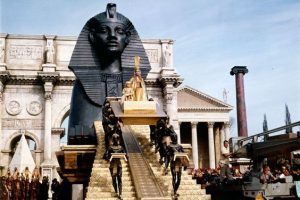
Another important factor that added to the glamour and luxury of the expensive film were the costumes and set pieces, which won the film an academy award. These set another record due to their cost: 30 wigs for Cleopatra and 125 pieces of jewelry totaling $130,000 (Cyrino 141). The extra’s in the battle scenes for Pharsalus, Philipi, and Actium had 26,000 costumes that cost half a million dollars, palm trees were flown in from California, and the fanciful barge Cleopatra sails in to meet Antony cost $250,000. The wealth of Egypt was reflected through these costume and set pieces; they showcase the wealth and opulence Cleopatra possessed and lived in. The scene in which Cleopatra enters Rome, lasting around seven minutes, cost almost $1 million (Cyrino 141). The soldiers, exotic animals, and Taylor’s dress—made from 24-carat gold thread—created the extravagant entrance that suited Cleopatra and Egypt’s wealth. This scene was not historically accurate, though, as it featured a reconstruction of the Arch of Constantine, which was not built for another three centuries after Cleopatra’s visit. The film not only attracts the eye with the grand settings and costumes, but also through the colors chosen. Warm and cool colors contrast within the settings and the costumes.
The actors play an important role in making these characters come to life. Harrison plays Caesar with sophistication, strength, and confidence, just how the real Caesar was. Harrison was nominated for an Oscar for his performance (Cyrino 144). Taylor as Cleopatra matched the challenge of playing the complex and powerful character, because she was this way in normal day life as a movie star.
This film focused on themes that parallel the genre of the film and that were concurrent with the time of the film’s release. The historical romance genre this film falls into encompasses the scandal and extravagance that surround the fragility and strength that powerful leaders can have. In the 1960s, the role of women in society was changing, so having the central character Cleopatra in control of the two men of the film, parallels this change (Cyrino 151). Cleopatra evokes the romance of the historical relationships among these characters, while still portraying the intellect of the queen.
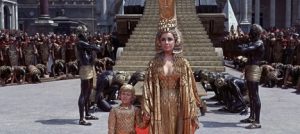
Gender roles in this time were being disputed, and sexual freedom was becoming more accepted, providing grounds for the film to explore these boundaries through Cleopatra’s seductiveness. Cleopatra presented an image of aggressive female sexuality, and is seen through the techniques of the camera which highlight these features (Cyrino 154). Ideas of female sexuality are also compared and contrasted in this film, through the idea of maternity and fertility that Cleopatra exhibits. The exploration of human sexuality in this film creates a romance different than the submissive and dominant nature of the traditional gender roles. This film in comparison to other films I have watched, portrays the romance/historical genre in not only the historical plot it is centered around, but uses the contemporary ideas within the decade to make the themes relatable to the viewer.
I think this film did an impressive job of portraying the extravagance of Egypt through the sets, costumes, and thematic approaches. My critique of the film would be the length, which seems to diminish the interest of the viewer past the two-hour mark. The storyline of the romance and relationship between Cleopatra with Caesar and then Antony split the movie almost into two parts, yet I feel some pieces could have been condensed in order to highlight the key scenes. I really enjoyed the extent of detail this film depicted, however, because it gave me a deep insight into the world of the Roman Empire and Egypt.
Cleopatra overall is an important film that through careful writing, casting, costuming, set design, and script interpretation depicts a crucial piece of Roman history. The technique of the director to incorporate current issues of the 1960s into the themes and messages of the film adds a realistic and relatable element for the viewer. This film accurately depicts most of the historical events as recorded by Plutarch and, like Plutarch, the film seeks to describe a moral code through the actions of its characters, in order to teach and empower the viewer. This film did a good job of engaging the audience in its historical tale of the extravagant and powerful Cleopatra who basically held in her hands the power of the Roman empire.
(Header Image: Caesar Giving Cleopatra the Throne of Egypt. By Pietro de Cortone, c. 1637. Musée des beaux-arts de Lyon via Wikimedia Commons. Public Domain {{PD-1996}}.)
Works Cited
Crowther, Bosley. “The Screen: ‘Cleopatra’ Has Premiere at Rivoli:4-Hour Epic Is Tribute to Its Artists’ Skills.” New York Times, 13 June 1963: Print.
Cyrino, Monica Silveira. Big Screen Rome. Malden, MA: Blackwell Pub., 2005. Print.
Jones, Prudence J. Cleopatra: A Sourcebook. Norman: U of Oklahoma, 2006. Print.
Pelling, C.B. R, ed. Plutarch: Life of Antony. New York: Cambridge UP, 1988. Print.
Plutarch. “Antony.” Plutarch’s Lives. Vol. 3. Trans. Arthur Hugh Clough New York, NY: J.M Dent & Sons, 1910. 268-327. Print.
Plutarch. “Caesar.” Plutarch’s Lives. Vol. 2. New York, NY: J.M Dent & Sons, 1910. 530-81. Print.
Hollywood and History is an on-going series featuring the original work of students in the course Ancient Worlds on Film. Papers have been slightly edited for publication.
